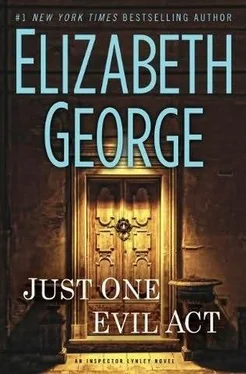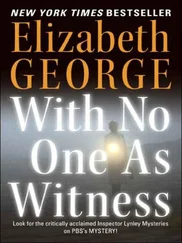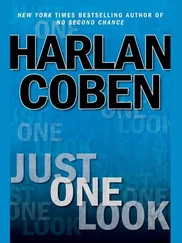He left the office. A brief passeggiata was in order, he decided, so he took a little detour instead of heading directly to the questura . He wandered in the opposite direction, telling himself the day and the exercise would do him good. That his exercise took him to Piazza dei Cocomeri was of no import. That in the piazza was a very large newspaper kiosk was purely coincidental. That the giornalaio sold newspapers in English, French, and German as well as Italian was merely an intriguing discovery. He did not yet have that day’s edition of The Source , however. The British newspapers generally arrived by late afternoon, flown over to Pisa and transported from the airport. If the ispettore wished a copy to be held for him, this could be easily arranged.
Salvatore said yes, he would like a copy of that particular paper. He handed over his money, nodded at the giornalaio , and went on his way. Certo , he could have used the Internet to see that morning’s edition of the tabloid. But he’d always liked the feeling of an actual newspaper beneath his fingers. And if he had no English sufficient to read what was in the pages of this tabloid, what did it matter? He could find someone to translate it for him. Eventually, he decided, he would do so.
VICTORIA
LONDON
Isabelle Ardery’s third meeting with the assistant commissioner took place at three o’clock. Lynley learned about it in the usual way. Prior to that meeting, Dorothea Harriman informed him sotto voce, there had been a flurry of phone calls from CIB1, followed by a lengthy encounter in Isabelle’s office with one of the deputy assistant commissioners. To Lynley’s question of which one of the DACs had met with Ardery, Dorothea lowered her voice even more. It was the one in charge of police personnel management, she told him. She’d tried to sort out what was going on, but all she could report was that Detective Superintendent Ardery had asked for a copy of the Police Act yesterday afternoon.
Lynley heard all this with a sinking heart. Sacking a policeman or -woman was an inordinately difficult manoeuvre. It wasn’t a matter of saying, “Right, you’re gone. Clear out your desk” because from a remark such as that, a lawsuit would follow as the night the day. So Isabelle had been necessarily careful in building her case, and although it pained him to know this, Lynley found that he couldn’t blame her.
He rang Barbara’s mobile. If nothing else, he could at least prepare her for what was to befall her when she returned to London. But he got no answer, and so he left a simple message for her to ring him at once. Then, after five minutes of waiting, he rang Salvatore Lo Bianco.
He was trying to get in contact with Sergeant Havers, he told the Italian man. Was she with him? Did he know where she was? She wasn’t answering her mobile and—
“I suspect she is on an airplane,” Salvatore told him. “She left Lucca at midday with the professore and little Hadiyyah.”
“Returning to London?”
“Where else, my friend?” Salvatore said. “We are at a conclusion here. To the magistrato I gave my report this afternoon.”
“What will he be pursuing, Salvatore?”
“To this, I confess I do not know. The case of Signora Upman’s death ends with Signor Mura. As to the kidnapping of little Hadiyyah . . . ? That was taken from me long ago, as we both know. It, too, is in the hands of the magistrato . And Piero . . . ? Ah, Piero goes his own way in things. I have learned not to attempt to direct him.”
That was the extent of Salvatore’s information. Lynley had the distinct feeling that there was more going on than Salvatore was willing to say via phone. But whatever it was, it was going to have to stay in Italy until such a time that Lynley travelled to Lucca again.
A phone call from Dorothea Harriman supervened upon his conversation with Salvatore Lo Bianco. DI John Stewart was in conference with the detective superintendent now. He had taken a copy of a tabloid into the meeting, Detective Inspector Lynley. Harriman thought it was The Source , but she couldn’t be sure.
Lynley rang Barbara Havers another time. Another time, it was her voice mail he heard. Just a surly “This is Havers. Leave a message,” in an impatient tone. He told her to ring him as soon as possible. He added, “Salvatore tells me you’re on a flight to London. We do need to talk before you come in to the Met, Barbara.” More than that, he wouldn’t say. But he hoped she sensed the urgency in his tone.
For an hour afterwards, he was weak-stomached. He recognised this not only as completely unlike him but also as an indication of how little he could do at this point to stop the concrete ball from rolling down the ice slope on which it had been perched. When his desk phone rang at last, he snatched it up.
“Barbara,” he said.
“Me.” It was Dorothea. “Coast is clear. Detective Inspector Stewart has just left her office. He’s looking grim.”
“With triumph?”
“Couldn’t say, Detective Inspector Lynley. Raised voices for a moment or two in there, but that was it. She’s alone now. I thought you might like to know.”
He went to Isabelle at once. On his way, he met John Stewart in the corridor. As Harriman had indicated earlier, the other DI carried a tabloid with him. He had it rolled into a tube, and when Lynley nodded at him and began to pass by, Stewart stopped him. It was a sharp move in which he slapped the rolled tabloid against Lynley’s chest. He moved in far too close, and when he spoke, Lynley could smell the acrid scent of his breath. He felt rising in himself the inclination to shove the other man against the wall by means of his hand on Stewart’s throat, but he quelled this inclination and said, “Is there a problem, John?”
Stewart’s voice was a hiss. “You think you were discreet, the two of you. You think no one knew you were fucking her, don’t you? We’re going to see about that one, you and I. This isn’t over, Tommy.”
Lynley felt his muscles go so tight that the only release for the energy that made them that way would have been to throw Stewart to the floor and throttle him. But there was too much at stake here, and the truth of the matter was that he hadn’t the slightest idea what was actually going on. So he said, “I beg your pardon?”
“That’s right, mate,” Stewart sneered. “You go all public school on me. That’s just what I would expect of you. Now get out of my way or—”
“John, I believe you’re in my way,” Lynley said quietly. He took the tabloid from the other man’s hand, where still it pressed against his own chest. “Thank you for this, however. A little light reading over dinner tonight.”
“You piece of shit. The two of you. The three of you. All of you directly up to the top.” This said, Stewart pushed past him.
Lynley went on his way, but as he did so, he opened the tabloid to see the front page. Mitchell Corsico’s by-line was no surprise. Neither was the headline Kidnap Dad Behind It All . He didn’t need to read the article to see that he had been outplayed by Dwayne Doughty. The private investigator was a master, he realised, the mouse who could wrest the cheese from the trap without even coming close to the neck snap that would kill him.
When he got to Dorothea Harriman, he nodded at Isabelle’s closed door. She said she would check and she spoke into her phone. Would the detective superintendent be available to see Detective Inspector Lynley? she enquired. She listened for a moment and then told Lynley to give his superior five minutes.
The five minutes that passed stretched to ten and then fifteen before Isabelle opened her office door. She said, “Come in, Tommy. Close the door behind you,” and when he’d done so, she gave a tremendous sigh. She gestured to her mobile and said, “It shouldn’t take such an effort to plan a holiday to the Highlands. Bob wants to argue that it’s ‘out of the country’ and as he has custody, et cetera, et cetera. Is it any wonder I took to drink?” And when he shot her a look, she said, “I’m joking, Tommy.”
Читать дальше












